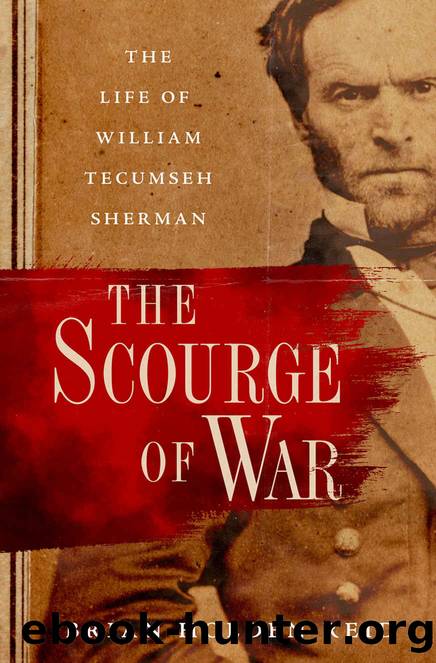The Scourge of War by Holden Reid Brian

Author:Holden Reid, Brian
Language: eng
Format: epub
Publisher: Oxford University Press
Published: 2020-05-18T16:00:00+00:00
13
Marching on to Savannah, September–December 1864
One of the first orders that Sherman issued after the fall of Atlanta concerned the civilian population. “Move all the stores forward from Allatoona and Marietta to Atlanta,” he instructed Slocum. “Take possession of all good buildings for Government purposes, and see they are not used as quarters.” He then continued in a benevolent tone, “Advise the people to quit now. There can be no trade or commerce now until the war is over.” It would be best for Unionist parties to “go to the North with their effects, and secesh families move on.” His armies were badly in need of rest, refitting, and recuperation—“and even more important, pay.” That day he issued orders that the Army of the Cumberland return to Atlanta, the Army of the Tennessee to East Point, and the Army of the Ohio to Decatur; Garrard’s cavalry would serve as the rear guard. To assault Hood’s current position along Walnut Creek would not be profitable. “Besides, there is no commensurate object,” he informed Halleck, “as there is no valuable point to his rear till we reach Macon, 103 miles from Atlanta.” To turn Hood’s position “would carry me too far from our base at this time.” He also reaffirmed his desire to remove the civilian population of Atlanta “so that we will have the entire use of the railroad back, as also such corn and forage as may be reached by our troops.” He sensed that his decision might be misrepresented. “If the people raise a howl against my barbarity and cruelty I will answer that war is war and not popularity-seeking. If they want peace they and their relatives must stop war.”1
On September 7 he wrote to inform John B. Hood formally of his intention to expel Atlanta’s population, allowing them to take their personal possessions (including “reasonable furniture”) to Rough and Ready. He did not insist on the emancipation of all slaves, as he should have done, and allowed those who wished to travel with their masters to do so; all who wished to stay “may be employed by our Quartermaster.” Sherman’s tone again was helpful rather than punitive. “Atlanta is no place for families or non-combatants, and I have no desire to send them north if you will assist in convoying them south.” If Hood agreed, he would order a truce around Rough and Ready for about two days. Far from gaining Hood’s accord and cooperation, this comparatively benign letter provoked what Sherman described to Ellen as “some sharp correspondence with Hood about expelling the poor families of a brave People.” His attitude was quite straightforward: Atlanta had become “a conquered place” to be used solely for military tasks, “which are inconsistent with the habitation of families of a Brave People.” He suspected rightly that Hood “no doubt thought he would make Capital out of the barbarity etc.” However, Sherman proved to be wrong in predicting that “he will change his mind before he is done.”2
Two days later Hood, to the contrary, dipped his pen in an inkwell overflowing with hyperbole.
Download
This site does not store any files on its server. We only index and link to content provided by other sites. Please contact the content providers to delete copyright contents if any and email us, we'll remove relevant links or contents immediately.
| American Revolution | Civil War |
| US Presidents |
Fanny Burney by Claire Harman(25784)
Empire of the Sikhs by Patwant Singh(22172)
Out of India by Michael Foss(16312)
Leonardo da Vinci by Walter Isaacson(11903)
Small Great Things by Jodi Picoult(6095)
The Six Wives Of Henry VIII (WOMEN IN HISTORY) by Fraser Antonia(4790)
The Wind in My Hair by Masih Alinejad(4424)
The Lonely City by Olivia Laing(4120)
The Crown by Robert Lacey(4105)
A Higher Loyalty: Truth, Lies, and Leadership by James Comey(4033)
The Iron Duke by The Iron Duke(3639)
Millionaire: The Philanderer, Gambler, and Duelist Who Invented Modern Finance by Janet Gleeson(3569)
Sticky Fingers by Joe Hagan(3454)
Alive: The Story of the Andes Survivors by Piers Paul Read(3310)
Papillon (English) by Henri Charrière(3269)
Joan of Arc by Mary Gordon(3258)
Stalin by Stephen Kotkin(3086)
Aleister Crowley: The Biography by Tobias Churton(3019)
Ants Among Elephants by Sujatha Gidla(2924)
